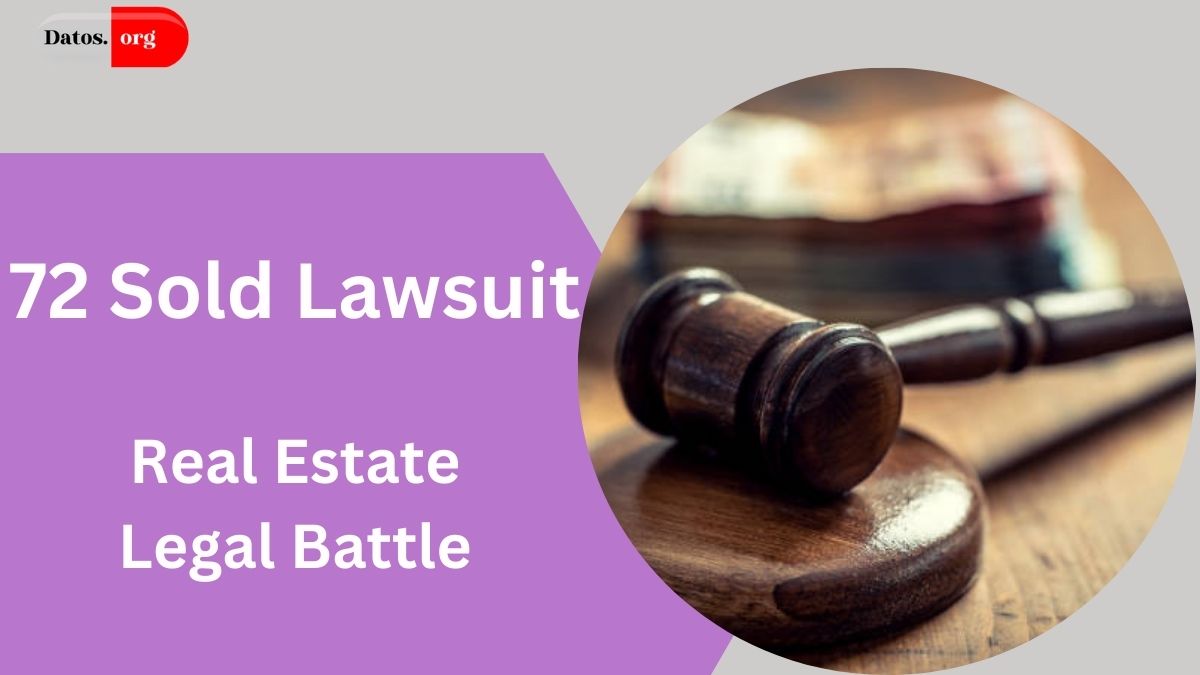Selling a home is often a stressful process, and companies like 72 Sold promise quick sales within 72 hours. However, what seemed like an ideal solution for fast home sales has now become a legal battle, with homeowners accusing 72 Sold of false advertising and misleading business practices.
In this article, we’ll explore the details behind the 72 Sold lawsuit, what it means for the real estate industry, and how homeowners can protect themselves when selling their properties.

- What is 72 Sold?
- Details of the 72 Sold Lawsuit
- Key Allegations
- Impact on Homeowners
- Financial Loss
- Loss of Trust
- Company Defense
- Key Points of Defense
- Current Status of the Lawsuit
- Potential Outcomes
- Legal Implications for the Real Estate Industry
- Consumer Protection Laws
- Changes in Marketing Practices
- How Homeowners Can Protect Themselves
- Conclusion
What is 72 Sold?
72 Sold is a real estate service that markets itself as a fast and efficient alternative to traditional home-selling methods. The company claims it can sell homes in just 72 hours, offering sellers speed, convenience, and higher-than-market prices for their properties.
The business model, which relies on aggressive marketing and promises of quick sales, has attracted widespread attention and a growing client base.
However, as the company’s popularity increased, so did scrutiny of its practices, leading to the current legal challenges.
Details of the 72 Sold Lawsuit
The lawsuit against 72 Sold centers on allegations of false advertising and misleading business practices. Homeowners who used the service have raised concerns that the company failed to deliver on its promises of fast sales and high returns.
Key Allegations
| Allegation | Description |
|---|---|
| False Advertising | Homeowners claim that 72 Sold’s marketing materials misrepresented how quickly homes would sell. |
| Misleading Business Practices | Sellers allege that they were led to believe their homes would sell for higher-than-market prices, which didn’t materialize. |
| Breach of Trust | The plaintiffs argue that 72 Sold failed to provide clear and transparent information about their processes. |
Impact on Homeowners
For many homeowners, the 72 Sold lawsuit has caused significant emotional and financial strain. Many sellers who signed up for the service believed that their homes would sell within days, only to find that their properties remained on the market much longer than expected.
Financial Loss
Some homeowners claim they were forced to lower their asking prices significantly or incur additional costs due to extended time on the market.
The discrepancy between the company’s promises and reality led to feelings of frustration and financial insecurity.
Loss of Trust
The lawsuit also highlights the growing mistrust among sellers who feel they were misled. This breach of trust can have long-term implications for 72 Sold’s reputation and future business prospects.
Company Defense
72 Sold has denied all allegations, maintaining its transparent marketing practices and providing homeowners with all necessary information upfront.
Key Points of Defense
- Transparency: 72 Sold’s legal team argues that the company clearly explains its process to homeowners, and that it never guarantees a sale within 72 hours for every home.
- Success Rate: The company claims that while not every sale can be completed within 72 hours, a significant portion of their clients do see fast sales, especially in competitive markets.
Current Status of the Lawsuit
The lawsuit is still in the pre-trial phase. Both sides present evidence, and the court determines whether the case should proceed to trial.
Potential Outcomes
If the plaintiffs win, 72 Sold could face significant financial penalties and be required to compensate affected homeowners. Additionally, the company may be forced to modify its marketing strategies to avoid further legal action.
Legal Implications for the Real Estate Industry
The 72 Sold lawsuit could have far-reaching effects on the real estate industry, particularly in how companies market their services. If 72 Sold is found liable for false advertising, other real estate companies may face greater scrutiny over their claims and practices.
Consumer Protection Laws
Real estate is governed by strict consumer protection laws that ensure transparency and honesty in transactions. This lawsuit could reinforce the importance of clear communication and realistic promises in marketing.
Changes in Marketing Practices
Real estate companies may need to adjust how they advertise fast home sales, avoiding overpromising and underdelivering on results. This case could set a legal precedent for future lawsuits in the real estate sector.
How Homeowners Can Protect Themselves
If you’re a homeowner looking to sell your property, it’s essential to do your research before choosing a real estate service. Here are some steps to ensure you’re making an informed decision:
- Read Reviews: Look at customer testimonials and reviews to get a sense of the company’s reputation.
- Ask Questions: Be sure to ask the company about their sales process, timeframes, and any potential risks involved.
- Consult Legal Experts: If you’re unsure about the terms of a real estate agreement, consult with a licensed attorney to ensure you’re protected.
Conclusion
The 72 Sold lawsuit is a cautionary tale for homeowners and real estate companies. While fast home sales may seem appealing, you must ensure that the company you choose is transparent and realistic about its promises.
As the legal battle continues, the outcome could reshape how real estate services are marketed and regulated, potentially impacting the entire industry.

I am a passionate technology and business enthusiast, constantly exploring the intersection where innovation meets entrepreneurship. With a keen eye for emerging trends and a deep understanding of market dynamics, I provide insightful analysis and commentary on the latest advancements shaping the tech industry.